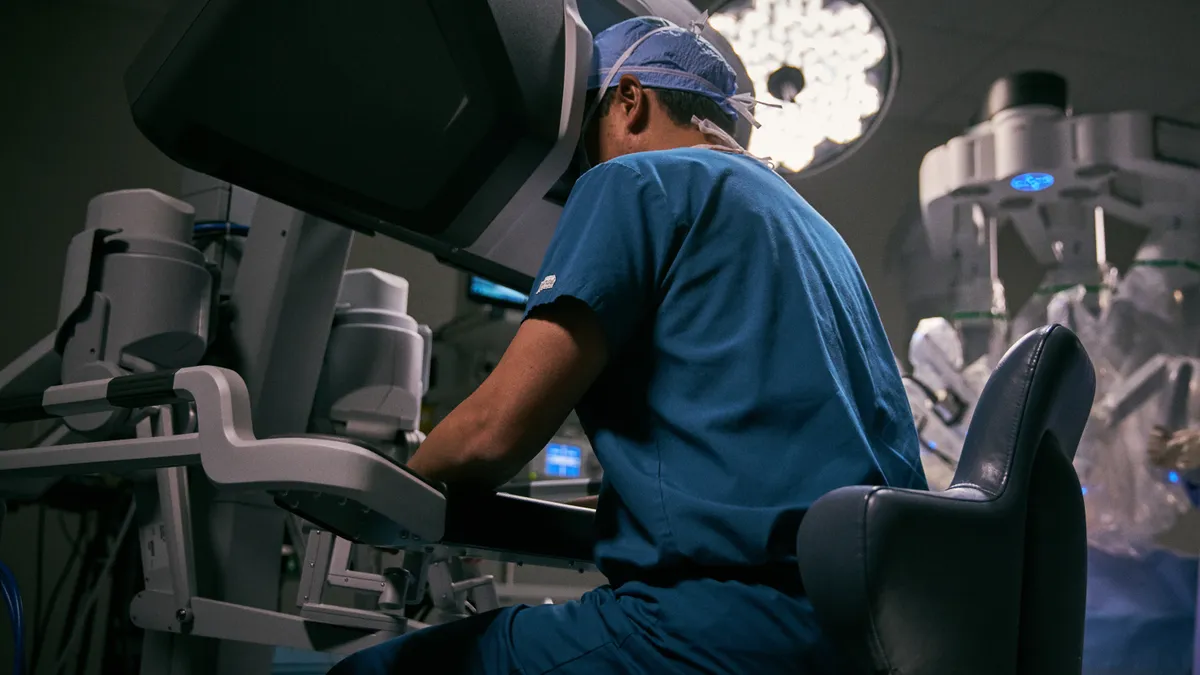Dive Brief:
- After warning in January that a spike in COVID-19 cases might dim its prospects in the year ahead, Intuitive Surgical on Tuesday posted results that beat Wall Street expectations, buoyed by strong new placements of its da Vinci robots and rebounding utilization of its installed systems.
- Intuitive CEO Gary Guthart told analysts the quarter was a "step in the right direction," noting "we saw a healthy recovery of surgery and use of our products."
- The improving conditions prompted the longtime robotic surgery leader to provide a 2021 forecast calling for full-year procedure growth in the range of 22% to 26%, driven by U.S. general surgery demand and faster adoption of its platforms outside the United States.
Dive Insight:
Intuitive saw system placements slow last year as hospitals deferred capital spending during the pandemic. As hospitals suspended elective surgeries and patients delayed care, total da Vinci procedures increased only 1% in 2020, to about 1.24 million performed worldwide. The discouraging trends carried over into the new year, when the company reported that early 2021 volumes were similar to the fourth quarter's weakest levels.
But as COVID-19 cases declined after January, procedures performed with the da Vinci system rebounded in February and March, rising 16% for the quarter in total, compared to a year ago. The recovery in procedure volumes, across such specialties as bariatric surgery, hernia, cholecystectomy, gynecology and urology, drove first-quarter revenue growth of 18%, to $1.29 billion.
Baird analysts said the quarter "smashed expectations ... This is a good company still innovating at a rapid clip with plenty of runway ahead," the analysts said.
Adding to the optimism, the upturn in Intuitive's capital placements in the first quarter exceeded the company's expectations and shows that hospitals are preparing for a post-pandemic environment, executives said on the conference call. Intuitive shipped 298 da Vinci systems in the first quarter, 26% higher than the year before, expanding its installed base to 6,142 systems as of March 31, up 8% from a year earlier.
Analysts at BTIG Research said capital demand at hospitals continues to outpace expectations, suggesting that health system finances are stronger than has been assumed. "ISRG delivered a standout quarter by most metrics, especially given a cautious tone to start fiscal year 2021," the analysts wrote in a note to clients.
Among its newer platforms, the company said it has seen strong interest in its SP single port system in various specialties and is designing clinical trials in pursuit of additional indications, while it installed 14 of its Ion flexible robotics platform during the quarter, bringing the installed base to 50 systems. The company also launched a digital app called My Intuitive that allows surgeons to view their operative data and participate in training.
The high end of Intuitive's 22%-26% procedure growth forecast for 2021 assumes that COVID cases continue to decline throughout the year and vaccine rollouts remain at the pace now expected by global governments, allowing patient surgery backlogs to continue to recover, the company said.
Still, there is cause for caution, Intuitive's executives said. Procedures that involve a long diagnostic process, such as prostatectomy and thoracic surgery, remain below historical levels. Though hospitals are better equipped to handle COVID-19 patients compared to when the pandemic began, resurgences of the virus and its variants in the U.S. and parts of Europe continue to affect demand for da Vinci procedures. More hospitals also are leasing systems, which defers revenue, and the number of trade-ins is expected to decline.
Intuitive executives also cautioned that they are keeping an eye on emerging constraints in the supply chain, particularly for semiconductors.
Beyond the pandemic's impact on da Vinci procedures, Intuitive is expected to face its first significant competition when robotic systems in development by Medtronic and Johnson & Johnson finally reach the market. Some analysts have said Medtronic's Hugo soft-tissue system could debut as soon as the fourth quarter. The medtech giant announced on March 31 it applied for a CE mark in Europe and an investigational device exemption with the FDA for Hugo. J&J is set to begin first-in-human trials for its Ottava system in the second half of 2022.











